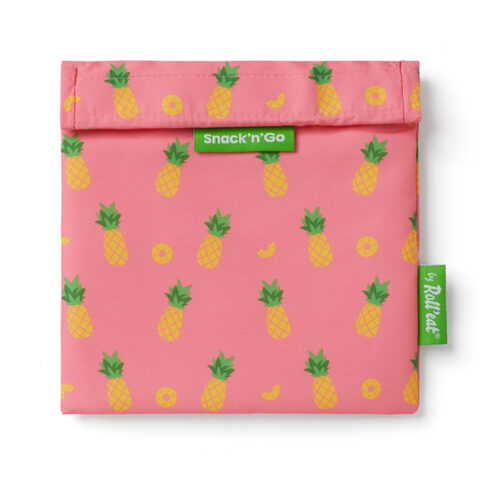The difference between vegan, vegetarian and pescatarian represent different approaches to food choices, each marked by diverse personal reasons. These eating styles are rooted in a variety of motivations ranging from ethical considerations to concerns about health and the environment.When comparing vegetarian vs vegan vs pescetarian, each group adopts a specific diet that influences their lifestyle, eating habits, and daily decisions.
Roll’eat philosophy
Roll’eat offers a wide range of products designed to meet the needs of those who care about the environment and have decided to eliminate from their diets those foods that cause a great deal of pollution due to their industry.
Our line of reusable sandwich wraps and reusable snack bags offers practical and sustainable solutions to preserve your meals. These products are made of durable, eco-friendly, easy-to-clean materials that ensure a convenient and environmentally friendly way to keep your meals fresh and healthy on the go.
Regardless of your dietary preferences, at Roll’Eat you will find a convenient and eco-friendly way to keep your vegan, vegetarian or fish dishes fresh and ready to enjoy anytime, anywhere.
Vegan vs. Vegetarian vs. Pescatarian
Vegan
Vegans exclude all animal products from their diet, such as meat, fish, dairy, eggs, and honey. But it doesn’t stop there—they also avoid using non-food items derived from animals, like leather, wool, silk, and beauty or cleaning products tested on animals.
A vegan person is someone who chooses not only what they eat but also how they live. It’s much more than just a diet; it’s a lifestyle that focuses on not using or consuming anything that comes from animals. There are different types of vegan lifestyles, depending on personal motivations and focus areas—some emphasize health, others animal rights, and many care deeply about environmental impact.
Instead of these products, vegans opt for a plant-based diet. Their meals revolve around fruits, vegetables, legumes, whole grains, nuts, and seeds, aiming to obtain all necessary nutrients from plant sources. This lifestyle may be motivated by ethical reasons, such as concerns for animal treatment, or environmental reasons, aiming to reduce the impact of the livestock industry on the planet. Moreover, many choose this way of life for its potential health benefits.
Being vegan isn’t just about what you eat but also about daily choices made. From the clothing worn to the cleaning or cosmetic products chosen, vegans seek animal-free alternatives that are more environmentally friendly. It’s a commitment to a lifestyle that aims to reduce negative impacts on animals, the planet, and personal health.
Vegetarian
A vegetarian diet is a dietary pattern characterized by the exclusion of animal meat in its various forms. Instead of consuming meat, vegetarians rely on a variety of plant-based foods to meet their nutritional needs. This includes a wide range of fruits, vegetables, legumes, whole grains, nuts, and seeds, which offer a diversity of nutrients such as vitamins, minerals, proteins, and healthy fats.
Within vegetarian diets, there are different approaches. Ovo-lacto vegetarians include eggs and dairy in their diet, while lacto-vegetarians limit themselves to dairy but exclude eggs. Ovo-vegetarians consume eggs but not dairy, and finally, strict vegetarians or vegans avoid any animal-derived products, including dairy, eggs, honey, and other animal by-products.
This way of eating can be chosen for various reasons. Some adopt a vegetarian diet for ethical reasons related to animal welfare, others due to concerns about environmental sustainability and the negative impact of the livestock industry. Some also choose it for health benefits, as numerous studies have suggested that a plant-based diet may contribute to preventing chronic diseases such as type 2 diabetes, heart disease, and certain types of cancer.
In summary, a vegetarian diet focuses on plant-based foods and excludes meat, and it can be adapted in various ways to meet individual preferences and nutritional needs.
Pescatarian
A pescatarian is a person who follows a diet that includes fish and seafood but excludes other forms of meat such as beef, pork, or poultry. This diet is primarily based on plant-based foods and seafood. Pescatarians consume a variety of plant-based foods like fruits, vegetables, whole grains, legumes, nuts, and seeds, and supplement their diet with fish and seafood.
This dietary choice can be motivated by various reasons. Some opt for the pescetarian lifestyle due to its health benefits, as fish is a rich source of omega-3 fatty acids, proteins, and essential nutrients. Additionally, fish consumption has been associated with improvements in cardiovascular and brain health.
Apart from health benefits, others choose to be pescatarians for ethical and environmental reasons, as in the other two diets explained above.
In summary, a pescetarian is someone who chooses a diet based on plant-based foods and seafood, excluding land-based meat for various reasons that may include personal health, ethical, or environmental concerns.

History of the diets
The three diets have been part of dietary history for centuries, with historical and cultural evidence suggesting dietary practices based on the exclusion of certain animal-derived foods.
For instance, vegetarianism has historical roots dating back to ancient civilizations across the world, such as in India. Religious and philosophical traditions like Hinduism and Jainism for ethical and health reasons for millennia.
In the case of veganism, as a contemporary movement and lifestyle, its origins trace back to the 20th century with the establishment of the Vegan Society in 1944 in the United Kingdom. Activists like Donald Watson promoted a diet and lifestyle free from animal-derived products, rejecting animal exploitation in all forms.
On the other hand, the term “pescetarian” emerged more recently, although this dietary practice has a shorter history compared to vegetarianism and veganism, it has gained popularity in recent decades due to the pursuit of more flexible dietary options and considerations related to health and sustainability.
But why are more people joining these diets?
The diets have seen a notable increase in recent decades, influenced by several factors:
Health Awareness
A surge in information about nutrition and health has triggered a growing interest in plant-based diets. These dietary choices, focusing on fruits, vegetables, whole grains, and legumes, are perceived as potentially beneficial for cardiovascular health and weight management. The understanding that these diets may contribute to reducing certain health risks has led many individuals to embrace them as part of a wellness-oriented lifestyle.
Ethical and Environmental Concerns
A rising number of individuals express concerns about animal welfare and the environmental impact of the food industry. Choosing meat-free diets is seen as a conscious effort to minimize animal suffering and lessen one’s environmental footprint. People are increasingly mindful of the repercussions of their dietary choices on the planet and the well-being of animals, thereby opting for plant-centric eating patterns.
Accessibility and Variety
The accessibility and variety of vegetarian, vegan, and pescetarian foods have significantly expanded across supermarkets, restaurants, and cafes. This increased availability of plant-based products and alternatives has facilitated the adoption of these dietary preferences. The broader selection of meat-free options has made it more convenient and appealing for individuals to transition towards these eating styles.
Cultural Shift
The rise in popularity of plant-based diets has spurred a cultural shift, leading to a greater acceptance and normalization of these dietary choices. Influential dissemination of information through social media and mainstream media platforms has played a pivotal role in promoting and mainstreaming these dietary trends. The portrayal of plant-based lifestyles as not only beneficial for personal health but also for the planet has contributed to their wider acceptance and integration into contemporary culture.










